 By Russell Johnson Political discourse is plagued by false either/ors. While there are sometimes mutually exclusive options (e.g., should we pass this law, or shouldn’t we?), people typically whittle complicated issues into simple dichotomies that distort more than they clarify. We often find ourselves in debates that aren’t about mutually exclusive options at all—Should we change abortion laws, or support would-be single mothers to make abortions less common? Should we protect free speech, or resist bigotry? Should we make sure everyone has access to good schools, or allow parents to choose where their children learn? I mean, why not both, right? That having been said, saying “Why not both?” always feels to me like a bit of a cop-out. To simply acknowledge that there are good points on both sides of a debate, or to insist that competing plans aren’t mutually exclusive, can be a lazy way of avoiding the difficult questions that give rise to the debate. “Why not both?” can be an excuse to stay on the sidelines, self-satisfied with one’s own enlightened detachment from any particular solution. I think “Why not both?” is important to remember, but not if it’s used to dismiss the need for commitment. It has a place in the conversation, but it can’t be the last word. One way to go beyond false dichotomies and beyond “why not both?” is to think in terms of the many factors that go into solving any complex problems. We have to think algebraically.
1 Comment
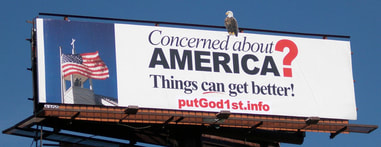 By David Barr Christians often credit or blame the changing fortunes of America on changes in our religious commitments. Some of these theories are nutty: I once heard a guy claim that Hurricane Katrina was punishment for a slackening of U.S. support for Israel at the time. Others aren't nutty, but still pretty strident: folks like Bill O’Reilly and Mike Huckabee have pointed to the end of prayer in schools as the cause of things like school shootings (okay, I take it back; that's still pretty nutty).* More subtly, many Christians point to evangelism as a way to address problems like crime and poverty or credit the Christian religion with successes in our nation’s past. People envision the connection between religion and the fate of the nation in different ways. Some, like the man with the Israel-Katrina theory, see God as directly intervening to bless or smite us in response to our policy decisions. Others see a more naturalistic cause and effect: Christianity makes us better people and a nation thrives when its people are more honest and hardworking, less violent, and so on. However they see it working, it is very common for American Christians to think our current problems are because we have abandoned Christianity. This is a really bad idea, and for a few reasons.  by David Barr Gun control supporters often struggle to understand the fierceness with which gun advocates oppose compromise on the issue. This struggle is understandable: if you think of guns as useful only for hunting or perhaps home defense – with the tradeoff being thousands of avoidable deaths – it is hard to see why anyone would stridently oppose all forms of gun control. It is thus important for gun control advocates to see the extent to which many gun advocates see the right to bear arms as a foundational right – perhaps even the foundational right – on which all the others depend. They will only understand that position if they see the way its roots reach into the myths of the American struggle for independence. It is likewise important for gun rights advocates to see how this belief rests on bad myths about the revolution. 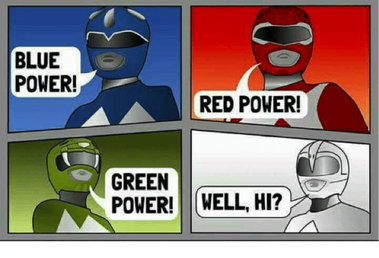 By David Barr White people often get defensive in conversations about race because it can feel to us like being white is always a bad thing. We have to be apologetic: whiteness is something to be ashamed of, not to celebrate. This can seem unfair. Because of this, you often hear people say things like, “If black people can have their own parades/awards shows/advocacy groups/TV networks/whatever else, why can’t we?”  by Russell Johnson Gun control is one of the most frequently talked about political issues in America, but these interactions rarely seem to change people’s minds. This might be true even of the most thoughtful, reasonable discussions, but the gun debate has been characterized by bad arguments that we should never expect to change anyone’s mind. This is often because representatives of one perspective caricature and misunderstand the logic behind other perspectives, so we end up arguing against positions that few people, if any, really hold. The more we rely on these shallow arguments, the more we insulate ourselves in bubbles, making it harder for us to understand one another and harder to seek the truth. In this post, I’ll survey nine all-too-common arguments, from "both sides," that we can safely retire.  Today marks the fiftieth anniversary of the My Lai Massacre. It's worth taking a moment today to reflect on this event, what it tells us about war and what it tells us about ourselves. Here's a blog post Russell wrote for the Political Theology Network reflecting on My Lai and how the dangers of dehumanization extend even into our everyday political discourse.  By David Barr When I was young, I became quite enamored with something called ‘apologetics,’ the art of defending the Christian faith against intellectual attack. At the time, it felt like learning Christian nerd karate. My friends and I would read up on things like the ontological argument for God and exchange CDs of debates between apologists and atheists like they were underground mixtapes or bootleg DVDs. Now, I don’t want to come across as dismissive of the very laudable attempt to articulate the Christian faith in an intellectually clear way. It is great for young Christians to learn to think for themselves and to learn how other people think differently. I think this phase was good for me, at least in the long run. Simplifications help young minds learn to think; the danger is when they persist in mature minds. 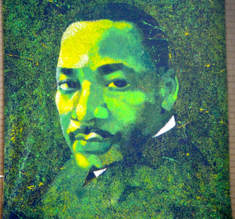 By Russell Johnson for Martin Luther King Day, 2018 Even as an elementary school student, I knew Martin Luther King Jr. took a stand for integration. But what “integration” meant for King is something I’ve only recently begun to understand. Integration must first be distinguished from inversion. King was not interested in merely transferring power from whites to blacks while keeping the exploitative power structure unchanged. An unjust society cannot be integrated, regardless of the color of those in charge. Being Liberal (or Conservative) Is Not an Accomplishment: On the Comfort of Political Polarization7/10/2017 By David Barr We are regularly reminded that our politics keep getting more polarized, and explaining why has become something of a national pastime. People blame social media, 24-hour news channels, or the fact senators don’t take time to smoke cigars together anymore, to name just a few. However, I fear we will underestimate the problem and fail to see its full range of consequences as long as we think of it only as a result of these new developments, rather than as something to which we feel a deep pull. It is not an unfortunate accident that these new factors drag us apart. It is in human nature to divide into camps, to be tribal, to want to see the world in terms of the good guys vs. the bad guys. And while I’m certainly not the first person to make that observation, there is one reason for that tendency that hasn’t been getting much attention: we are drawn toward political polarization because it feels good, because it satisfies our consciences. By David Barr
When I prepared to leave the confines of rural, evangelical middle America for the imposing halls of secular, University-of-Chicago middle America, many of my Christian friends expressed grave concerns about the dangerous ideologies I would encounter there. They mentioned atheism, of course, but their main concerns were post-modernism and moral relativism. I was warned I would encounter people who didn’t believe in objective truth, who thought everything was subjective. Now, I did run into a lot of that stuff, especially among students with unruly hair, who smoked cigarettes, used “construct” as a noun, and said things like “Foucault.” Even students with normal hair often told me that what I believed was fine, but that there was no way to really know what was true when it came to things like religion and morality.  By Russell Johnson I once read about a woman who tried to send an email to an accounting firm that said, “I am afraid that we will have to postpone our meeting.” But she hit ‘send’ prematurely, and all the email said was: “Hi Jeffrey, I am afraid” This sort of thing happens to all of us. This week, it happened to President Trump. Shortly after midnight, Trump tweeted, “Despite the constant negative press covfefe”. Everyone immediately recognized that he was trying to type “coverage” and slipped up. He made a typo on social media and hit send before fixing it, which again is not a big deal, even for a sitting president. People had a lot of fun with “covfefe,” but it is a human mistake, maybe even an endearing mistake, for the President to make. But then…  By David Barr My sociologist friend, Sam, has a great illustration about the persistent effects of racism: he asks his students to imagine that they are watching a game of Monopoly and one player (let’s say the Thimble) is not allowed to buy property for the first five turns, but does pay rent, while everyone else plays under the normal rules, snatching up several of the best properties. Sam asks his students to imagine they are put in charge of the game after the fifth turn and asks them to think about the best way to make sure the game will be fair going forward.  By David Barr Questions of capitalism and socialism, if they ever truly went away, came roaring back into the public conversation during the 2016 election. With them came misunderstandings about what these terms mean, and about American history. It seems to me that when liberals (particularly young ones) say ‘socialism’, they have something like contemporary Scandinavia in mind; open, educated, democratic, and with the highest quality of life in the world. When conservatives (especially older ones) hear ‘socialism’, they think of the USSR or North Korea: repressive, totalitarian, and with inefficient economies that collapsed under the weight of oppressive government control. This obviously leads to lots of head shaking by each group at the seemingly unreasonable beliefs of the other. That phenomenon is certainly worth a post of its own. Right now, however, I’m just going to use the fact that many conservatives interpret 'socialism' in terms from the Cold War as an excuse to make a point about capitalism and communism. I had been pretty sure that nobody wanted to read what I've been thinking about these old Cold War debates, but they seem relevant now that it is clear that those debates still hang over our current ones. I’m now convinced that taking you on a few minutes’ excursion into the mindset of the 1950s can help bring light to our contemporary political conversations. The lesson of the Cold War, I believe, is that the capitalists and the communists were both right…about each other. Let me explain:  by Russell Johnson In defense of the recent executive order about immigration, Senator Steve Daines wrote, “We are at war with Islamic extremists and anything less than 100 percent verification of these refugees’ backgrounds puts our national security at risk. We need to take the time to examine our existing programs to ensure terrorists aren't entering our country. The safety of U.S. citizens must be our No. 1 priority.” No doubt, the Senator expresses what many in our country are thinking. There is much to be said, and much that has been said, about the effectiveness and rationality of this particular executive order. But I’d like to focus on two truths we must not forget: No matter what we do, innocent Americans are going to die. But there are fates worse than death. 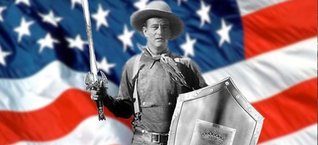 Much has been written about our polarization in values and ideologies, and now much more has been added about our different sources of information and “alternative facts.” This post focuses on another important, but neglected, area of divergence and source of disagreement: the myths we tell that form the context of the values we hold and the facts we accept. My hope is that pointing to myths as an arena of misunderstanding can provide a path forward in cases where agreement and empathy seem impossible. 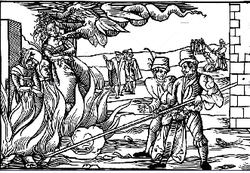 There is a longstanding view that people all have access to the same facts and their political differences are due to different moral values. This may never have been true, but at the very least it is an inadequate framework for understanding contemporary political disagreements. C.S. Lewis was once presented with an argument for moral progress. We must have developed better moral principles, he was told, since years ago there were witch-burnings but nowadays the majority of Englishmen finds this practice ghastly. His response is instructive: “But surely the reason we do not execute witches is that we do not believe there are such things. If we did—if we really thought that there were people going about who had sold themselves to the devil and received supernatural powers from him in return and were using these powers to kill their neighbors or drive them mad or bring bad weather, surely we would agree that if anyone deserved the death penalty, then these filthy quislings did.” He then spells out his point more precisely, “There is no difference of moral principle here: the difference is simply about matter of fact.”[1] Those who burn witches and those who don’t, according to Lewis, differ more in their beliefs about what is the case than in their moral values. Many of the disagreements tearing Americans apart this election cycle are differences not of principles but of facts.  A reading from the Psalms: "The heavens declare the glory of God, and the sky above proclaims his handiwork. Day to day pours out speech, and night to night reveals knowledge.” Psalm 19:1-2 In at least one sense, science is the original human vocation, a call to share with God in his wonder-filled attention to his creation. In Genesis, we see that as God creates, he calls the different things he makes “good.” When creation is finished and God beholds “everything that he had made,” he declares it “very good.” Then he does something remarkable. He places his final creation—Adam—in the Garden of Eden and gives him a task: to name each creature. Thus, God not only rejoices in the goodness of his creative work, he creates beings who can share in knowing and appreciating it in its particularities. Thus, we see that the original, pure communion between God and man is focused, not in on the relationship between the two of them as individuals, but out toward all creation.  What do we mean when we say “America”? This is a more complicated question than it first appears. To answer it, of course, we need to talk about football. During the NFL preseason, most professional football players are focused on only one thing: not tearing their ACLs. But this year, Colin Kaepernick caused an uproar for choosing to sit during the national anthem. As he said in interviews, he is disheartened and incensed by racial prejudice in America, in particular with regard to police brutality. “This country stands for freedom, liberty, justice for all,” Kaepernick said, “And it’s not happening for all right now.” Unsurprisingly, there has been considerable backlash against Kaepernick for this, principally asserting that it is an act of disrespect against America and American veterans. Equally unsurprisingly, there has been backlash against the backlash and protests against the protests. For the moment, I’m not going to protest anything. I simply want to use this as an opportunity to point out a rhetorical effect at play in the conversation.  by Russell Johnson It’s only August, but we already know who TIME Magazine’s Person of the Year will be. It’s not Simone Biles, it’s not Elon Musk, and it’s not Pikachu. No, in 2016 no one has been in America’s spotlight more than Donald Trump, and it’s not even close. He has been protested, praised, scrutinized, reviled, endorsed, criticized, quoted, and parodied more than anyone. He is the tap on the knee to which everyone immediately reacts. If 2016 were a novel, Trump would be the main character, and every other character would take their place in relation to him. It’s hard to overstate the widespread obsession with Trump which has captured the imagination of pundits, news media, and bloggers, especially those on the left. The pull is hard to escape—there’s just so much to say about him. There are so many things to criticize; scholars, artists, and comedians are relishing in the opportunity to unload their full critical arsenal. Finally there is a villain deserving our smug liberal heroics. So we enlist in the war of everyone versus Trump. And as so often happens in wartime, we violate the very principles for which we fight. Some of the casualties of 2016 have been objectivity, charitable interpretation, tolerance, a cooperative approach to governance, and even basic respect.  by Russell Johnson Clint Eastwood was in the news this week, not for remaking Denzel Washington’s “Flight,” but for some comments he grumbled angrily during an interview with Esquire. When asked about Donald Trump in an interview, Eastwood said, “He’s onto something, because secretly everybody’s getting tired of political correctness, kissing up. That’s the kiss-ass generation we’re in right now. We’re really in a p**** generation. Everybody’s walking on eggshells. We see people accusing people of being racist and all kinds of stuff. When I grew up, those things weren’t called racist.”  I recently heard a Christian speaker talk about violence in Chicago. According to him, the answer to the problems plaguing the south and west sides of the city is simple: these communities need to embrace the Gospel. This is not an unusual way for Christians to think, of course, and it might seem to flow from some of the central tenets of the faith. Becoming Christian should make people better, right? If enough people are transformed, that should make neighborhoods better, too. Plus, we look around our churches and see a bunch of (mostly) nice, smiling people who seem unlikely to commit murder. It is only reasonable, then, to think that if we could only bring enough of our neighbors into the Church and into faith, then a host of societal problems would be solved. While I understand the temptation to think this way, I'm increasingly convinced that this is not how Christians should think and talk about social problems.  Michelle Obama mentioned in her DNC speech that the White House was built by slaves. Bill O’Reilly then announced on his show that he had looked it up and reassured his viewers that the "slaves that worked there were well fed and had decent lodgings provided by the government, which stopped hiring slave labor in 1802.” People were justifiably angry with O’Reilly over this. It came across like he was saying, “Yeah, ok, I admit the U.S. government used slaves in the past, but it wasn’t that bad and we stopped doing it right away. We can all keep our faith in America’s moral purity.” His comment and the backlash got me thinking about the defensiveness on all sides here. O’Reilly and others of his ilk have very little patience for criticism of America’s past greatness, what they call “revisionist” history. Since America is clearly great, to point out its foibles and imperfections is to obscure the issue, when (to them) America's greatness is clear. Likewise, folks who think slavery and its legacy are a really big deal have very little patience for people pointing out the times it wasn’t so bad. Since slavery was clearly an abomination, to bring up mitigating examples of humane treatment of slaves is (to them) to obscure the verdict of history.  Earlier this week, Wayne Grudem endorsed Donald Trump. You may be thinking, “Big deal. I bet a lot of people named Wayne endorsed Donald Trump.” But Wayne Grudem is different. He’s the author of the systematic theology book used by more evangelical seminaries than any other. It’s currently listed as the #1 bestselling Protestant theology book on Amazon.com, and the #1 bestselling systematic theology book. Grudem has been influential among evangelicals for decades now; his writing and teaching form the intellectual backbone of many pastors’ and writers’ theologies. His article, “Why Voting for Donald Trump Is a Morally Good Choice” feels to many of my fellow evangelicals as a betrayal. Though it was scarcely surprising that public evangelicals like Jerry Falwell Jr. and Franklin Graham—whose names are bigger than their influence—supported Trump, it hurts to see  The other day my friend told me something I’ve heard from many Christians over the years. He said, “As a Christian I think it is the church’s job to help the poor, not the government’s.” While this sentence has a nice, reassuring neatness, it is actually a pretty problematic way to talk about politics “as a Christian.” To see why this is the case, consider first the “as a Christian, I think” part of his statement. Now, obviously, we can think a lot of things "as Christians." To name three, we could think that Christians should love their neighbors, that the death penalty is wrong, or that pizza is delicious. It is clear that thinking of them “as a Christian” means something different in each case.  [Originally posted on Facebook on 2/12/16] Dear haters of Beyoncé's Super Bowl performance, No. I'll be more specific. Many people have criticized Beyoncé and her dancers for dressing up in outfits reminiscent of the Black Panthers from the 60s and 70s. So people are upset because Beyoncé is representing a group with a violent history at an NFL game? The same NFL that has a team called the Vikings? And one called the Raiders? And the Buccaneers? And, while we're at it, one called the Texans? But whatever, I'll let it slide. I for one think Beyoncé can reasonably laud the Black Panther Party's commitment to organize against police brutality without thereby endorsing all of the actions taken by its members. But there's room for argument. |
Archives
September 2020
Categories
All
|


 RSS Feed
RSS Feed